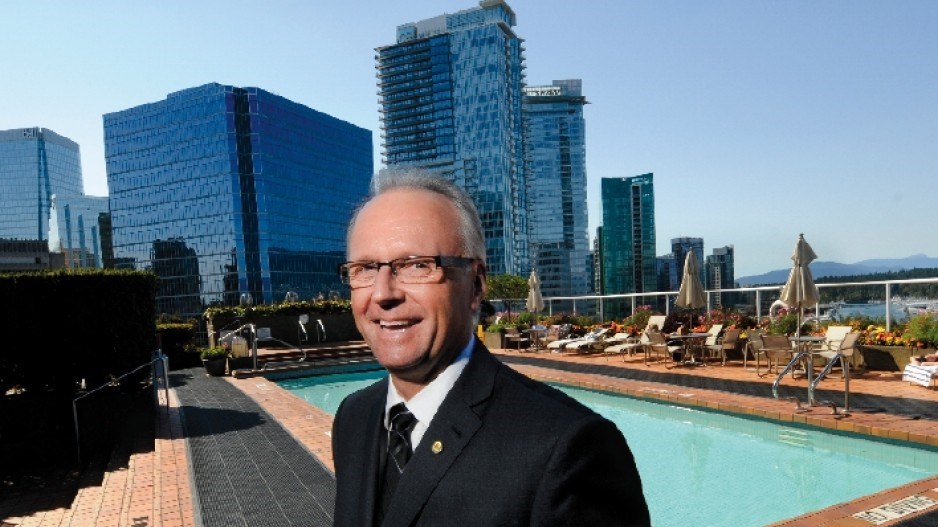Any way you slice it, philanthropy can boost a profile and drive business.
Tim Tindle, general manager of the Pan Pacific Vancouver, knows these perks as well as anyone, but said providing charities with facilities and the financial resources can be a big drain on financial resources.
He offers as an example the Pan Pacific's Christmas Wish Breakfast, an annual toy drive that attracts between 4,000 and 5,000 people every year and serves families in need across Metro Vancouver. The upshot is the event comes with a hefty price tag.
"It does cost us a lot to put it on, but it's worth the overall goodwill it creates," he said, adding that the additional PR is always a plus.
He said charity work is a core value of the hotel's management and staff. The hotel supports three charities year-round – Canuck Place, Covenant House and the BC Hospitality Foundation – by offering services, staffing and other support for events whenever they need it. All employees have the opportunity to offer automatic monthly support payments to these organizations. About 25% of employees, Tindle said, take part in the program.
Tindle estimates that they contribute "several thousand dollars" in hard cash to these charities every year, and the equivalent of about $30,000-$50,000 annually for services given to the charities whenever they throw an event.
"It's just a good business practice," he said. "We're in business here. We get lots of benefit from the community for being in business here and, you know, we just want to give back when we can and when it will help out. It's no more complex than that."
Philanthropy is a common practice within the hospitality industry, but it varies from business to business.
Mark Brand, owner of Save-On-Meats, and co-owner of two Gastown restaurants – Boneta and the Diamond – provides assistance for residents of the Downtown Eastside by employing barrier employees – those with addictions, mental health issues or other barriers that prevent them from finding employment – through what he calls the "informal economy.
Philanthropy is good business, he said, because people (particularly, he's noticed, people between 25 and 45 years old) are eager to revitalize their city and help those in need. They're loyal to businesses that have aligned with their own values.
"It's social equity," he said.
"People stay with us," he said. "It's like, 'My god, I'm part of this machine that does this thing,' and there's real metrics on it."
Save-On-Meats has created a program where several employees are tasked with co-ordinating barrier staff – the street sweepers, maintenance workers and window washers, etc. – in order to enforce regimented staffing to ensure they have a successful product.
Save-On-Meats has also partnered with Atira Women's Resource Society for a meal program, providing one nutritional meal every day for Atira's residents. Atira funds a majority of the program while Save-On-Meats executes it using barrier employment and kicking in extra money from the butcher shop and diner whenever it's needed. The program has grown from serving 80 people when it was launched in fall 2011 to just under 500 people at all seven of Atira's hotels. Brand said he's working on increasing that number up to 1,500 by the second quarter of 2013.
Vance Campbell, former CEO of Canvas Lounge Inc. and current operations specialist for Rising Tide Consultants, also understands the benefit of philanthropy to business.
"There's a commercial aspect to it, in the sense that you get pretty good community optics from doing those kinds of things," he said.
For one, there's the press that often comes along with charity work. Then there's the profile boosted among a charity's board of directors, many of whom are successful business owners or CEOs that are often loyal to businesses that have provided excellent service in the past.
Before it shut down earlier this year, Campbell estimates 70% of Canvas Lounge's business was charity- related. Through that, he said this helped drive incremental off-charity business through the contacts he'd made during charity events. Canvas Lounge and Canvas Catering would often host Christmas parties for high-profile companies. The lounge was kept very busy as a result of these contacts.
But Campbell is quick to note that the financial benefits, great as they can be, are practically an afterthought for many philanthropic hospitality workers.
"The people in the hospitality industry really do have a bent toward helping others," Campbell said. "That's the business that we're in. We're in the business of taking care of people, right? From an organic perspective, it's in our soul to be that way."




